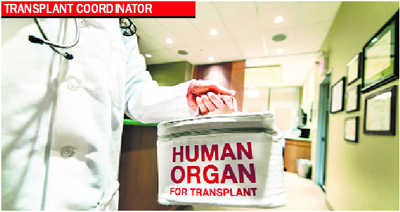
The word donation is derived from the Latin verb ‘to give’. It is widely acknowledged that there is no greater gift than the gift of life. The opportunity to donate organs following Brain Death (BD) of a loved one provides a silver lining to the cloud of grief that engulfs a family. A single non-living beating-heart donor can save several lives by donating the heart, lungs, liver, kidneys, pancreas and small bowel. These are the six organs that can be donated and nine lives can be saved. Also, once the heart stops beating, several tissues like cornea, heart valves, eardrums, ear bones, tendons and skin can also be donated.
.jpg) There are hundreds of brain dead patients in intensive care units across the country but counselling for organ donation does not happen because of lack of awareness and lack of processes and protocol.
There are hundreds of brain dead patients in intensive care units across the country but counselling for organ donation does not happen because of lack of awareness and lack of processes and protocol.
In the absence of a robust deceased organ donation programme in the country, only a few affluent and fortunate patients undergo organ transplantation, that too from a living donor. A system based on retrieving organs from living donors not only excludes heart, lung, intestine and pancreas transplantation, but also lends itself to risk to the life of a healthy donor, coercion and desperate attempts at procuring organs. The availability of medical expertise, infrastructure, resources and increasing awareness on organ donation, coupled with the new Transplantation of Human Organs and Tissues Rules 2014 (THOTR 2014), are ready to propel India into a new exciting phase of deceased organ donation.
Awareness generation
There are several aspects to organ donation that need to be understood and addressed. The concept of brain death, the recent change in law, the need to declare brain death early, method and timing of approaching grieving families for organ donation by skilled Transplant Coordinators (TC), donor maintenance protocols, the documentation involved, the role of police in medico-legal clearance and providing green corridors and so on.
The THOTR 2014 lays down the pre-requisites for hospitals for registration as transplant centers. Appointment of a qualified TC is one of them.
With over 300 hospitals currently licenced for organ transplantation, this provides for a huge opportunity for youngsters to undergo training in the field and make a difference to this world. Moreover, the Ministry of Health and Family welfare has decided to provide two TCs to all major government hospitals.
Who is a Transplant Coordinator
 A TC is defined as "a person appointed by the hospital for coordinating all matters relating to removal or transplantation of human organs or tissues or both and for assisting the authority for removal of human organs".
A TC is defined as "a person appointed by the hospital for coordinating all matters relating to removal or transplantation of human organs or tissues or both and for assisting the authority for removal of human organs".
Role of a TC
The main responsibilities of the TCs are two-fold: to increase the number of organs and tissue made available for transplantation and to facilitate the process of organ donation and transplantation. Another pivotal aspect of the TC’s role is to facilitate the organ retrieval process and remain the central point during the entire process. The Transplant Coordinator works in proximity with the medical and nursing staff of the specialty as well as with the donor’s family.
Work profile
Over a hundred individuals are involved during the hectic process of a multi-organ retrieval and transplantation, often in the middle of the night or over weekends. Deadlines, frayed tempers, no time to eat, lack of sleep and yet, lives to be saved. And then in the midst of all the chaos, there is the TC. A smile on the face, a comforting word, a tender touch, a phone call, a document filled, a cup of tea provided, a tear wiped, and invariably, a quiet tear shed in the corner with no one watching. Always available, and yet staying in the background. Like a moon on a cloudy night, a light shining through the darkness, obscured by darkness at times, but always there.
The growing transplant waiting lists obligate TCs to strive to increase the supply of transplantable organs. But the commitment to respect the rights of patients and their families require that consent be obtained by people who are, in turn, committed to being fully transparent, fair, and evenhanded. The main challenge for a TC faced with competing ethical obligations is to find a balance that will preserve the most essential ethical principles.
Who can become a TC?
Graduates in nursing, social work, psychology, allied health sciences, and doctors would be eligible for the role of TC. A formal course on transplant coordination is being run very successfully by Mohan Foundation, a not-for-profit organisation with headquarters at Chennai.
The courses, of one-year and 6-months duration have been tailored to suit the requirement of the candidates from both medical and non-medical background. The training modules cover the core components that govern organ donation and transplantation - medical, legal, ethical, cultural and religious aspects, grief counselling and transplant coordination. It includes lectures defining the moral component as well as practical workshops.
Training ground
To address the training needs of this cadre of healthcare professionals, Fortis Memorial Research Institute at Gurgaon has been running a five-day certificate course in the first week of April every year for the past two years. The course, planned and executed along with MOHAN Foundation, with faculty from across the country, attracts candidates not only from most states but also from abroad. This course provides weightage to the basic qualification of the candidates by providing them an insight into this complex field.
Spain is the country that boasts of maximum organ donations globally. Transplant Procurement Management (TPM) is their international educational programme in organ and transplant coordination that counts with the academic endorsement of the University of Barcelona. It promotes knowledge transfer and development of professional competences in organ donation as key factors to maximise donor potentiality and conversion rates. Using the "Learning by doing" methodology, TPM offers a wide range of online, face-to-face and blended courses, providing one with the opportunity to learn how to identify a potential donor and how to manage all the donation and transplantation process following standards of high quality and ethics. TPM offers programmes of various durations.
The process of organ donation without an effective TC is like an octopus on roller skates. There is plenty of movement but you never know if it is going to be forwards, backwards or sideways.The success of an organ donation and transplant program depends on good coordination and trained transplant coordinators are the key.
Why donate
 In India, less than 5,000 kidney transplants are carried out annually against an estimated requirement of over 1,75,000.
In India, less than 5,000 kidney transplants are carried out annually against an estimated requirement of over 1,75,000. - Similarly, only 1,000 liver transplants are performed every year in a country where over 50,000 perish due to end-stage liver disease, mostly related to preventable causes like hepatitis B and hepatitis C.
- The annual requirement of hearts is estimated to be around 50,000 and lungs about 20,000.
- The requirement for intestine and pancreas transplantation, likely to be considerable, remains unknown.
- While majority of organ transplants in the world are done from deceased donors after BD, most of our programmes are based on living donors. India has the dual ignominy of maximum number of road accident related deaths in the world but one of the lowest organ donation rates.
- The reasons for poor deceased organ donation in India is poorly understood. Even though illiteracy and strong social and religious beliefs were thought to be responsible, experts believe that lack of awareness, not only in the general population but also amongst doctors and para-medical staff, is the main reason.
- Religious beliefs are a punching bag that we tend to use as an excuse for poor organ donation in the country. Lack of awareness on brain death and the process of organ donation amongst medical professionals as well as the public and failure to have systems in place is the prime reason for lack of organ donation. It is a myth that organ donation is prohibited by some religions.



























